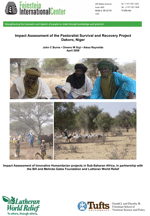This report is the outcome of an impact assessment of the ‘Pastoralist Survival and Recovery Project’ implemented by Lutheran World Relief and partners in North Dakoro, Niger. The assessment is the last of four impact studies carried out by the Feinstein Center under the “Impact Assessment of Innovative Humanitarian Projects in Sub-Saharan Africa” research initiative supported by the Bill & Melinda Gates Foundation. The ‘Pastoralist Survival and Recovery Project’ was designed to assist ten pastoral communities living in the Tarka Valley recover from the effects of a prolonged drought, culminating in locust attacks and a failed harvest in 2004. The project also aimed to enhance the capacity of pastoral communities to cope with the effects of future droughts and other shocks by ensuring year round access to food and income. The main project activities included the establishment of six livestock feed banks, restocking of small ruminants, and the construction of four wells for both human and livestock utilization.
The impact study focused on the re-stocking and animal feed bank project interventions, and set out to assess what changes in household food security and income had occurred as a result of the project. The study also looked at how the re-stocking activities might have potentially improved participants resilience to future droughts and other shocks. The assessment was carried out by project staff from Lutheran World Relief and Contribution a l’Education de Base, and supported by a consultant from Lutheran World Relief and a consultant and a research assistant from the Feinstein International Center.







